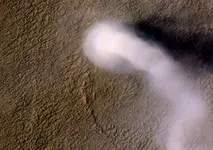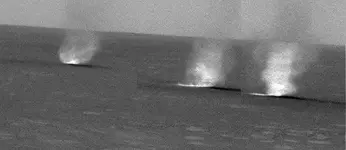That 70 degree thing is a guess by NASA and also - what is water? H2O - What's the O? Hmmm, that's right - Mars is lacking on the Oxygen portion of that ratio...............
I talked with an alien friend of mine - It said there's never been water on Mars. So, Limitool - let's hear your rebuttal to those facts!

Since I don't have alien friends that "know" the "facts" and I just got a grade school "lesson" on what makes up water (again)... I guess I'd have to just ask where your "facts" come from in this day and age? This isn't so much a rebuttal as.... where did you get the idea that NASA has to guess what temps are on a planet or what its chemical makeup is? Are you aware that different light spectrums give an exact chemical present?
I believe NASA doesn't have to "guess" at anything concerning the chemical makeup of any planets close to us and many far away. Nor do they have to "guess" about temps either. It's pretty simple. All the crafts circling Mars now all carry instruments which were thoroughly tested on our own planet before being deployed there. The two remaining rovers working yet send back temps daily from their respective locations.
We think of Mars as a dry, dead planet. That is fairly accurate, but at night the planet achieves 100% humidity. During the day it is very dry, here is why. Humidity is the amount of water vapor in the air. It varies daily and depends on the temperature: warm air can hold more water vapor than cold air . Humidity is measured as a percentage of the maximum amount of water that the air can hold at a given temperature. The greater the difference between the two temperatures, the greater the evaporation. When there is a lot of evaporation, the air is drier and the humidity is low. On Mars, the air is saturated (100% humidity) at night ("O"), but under saturated during the day. This is because of the huge temperature difference between day and night.
Mars' thin atmosphere and its greater distance from the sun mean that Mars is much colder than Earth The average temperature is about minus 80 degrees F, although it can vary from minus 195 degrees F near the poles during the winter to as much as a comfortable 70 degrees F at midday near the equator. This is not a guess by NASA.... It's a know fact and been know for quite some time.
The atmosphere of Mars is about 100 times thinner than Earth's, and it is 95 percent carbon dioxide. Here's a breakdown of its composition:
Carbon dioxide: 95.32 percent
Nitrogen: 2.7 percent
Argon: 1.6 percent
Oxygen: 0.13 percent
Carbon monoxide: 0.08 percent
Also, minor amounts of: water, nitrogen oxide, neon, hydrogen-deuterium-oxygen, krypton and xenon
These also are not "guesses" but known facts.
Something as close as Mars doesn't leave much to the imagine concerning its present chemical makeup nor its temp swings now. NASA is way past the "guessing" part on this and other planets. The latest rover Curiosity is now drilling and checking
PAST history of Mars climate changes and makeup. But its know present ones are well known along with its radiation. NASA, scientists and this planet have long known that the polar caps contain frozen water. All water has the "O" in it... duh... or it wouldn't be classified as "water". Oxygen is easily "trapped" within permafrost and frozen waters. Hell even the moon has frozen water in some craters including the (O).
Are your "facts"
beliefs or something you read from NASA. This isn't a rebuttal to you in as much as your "lesson in water makeup"....



 ? Hmmmm, doesn't seem too plausible from a common sense stand point.
? Hmmmm, doesn't seem too plausible from a common sense stand point. 


